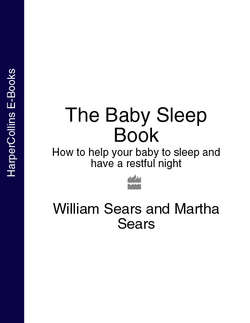Читать книгу The Baby Sleep Book: How to help your baby to sleep and have a restful night - Martha Sears - Страница 21
how babies sleep at various ages
ОглавлениеAs with all developmental milestones, the age at which babies wake up less and start “sleeping through the night” varies from baby to baby. Here are the general sleep patterns that most babies follow at various stages along the way to sleep maturity:
Newborn period. In the first month, babies tend to sleep a total of sixteen to seventeen hours a day. They sleep in three to four hour stretches with an equal amount of sleep during the daytime and nighttime hours. At this age babies wake up mainly from hunger (which they don’t experience until they’re born, so it’s very scary for them at first).
One to three months. Between six and eight weeks of age, babies begin to “consolidate” their sleep into shorter periods during the day and slightly longer periods at night. They sleep from 15 to 16 hours a day. At this age, most babies wake up at least once a night and need a feeding and help to resettle (many will wake up two or three times). Babies start waking up not only from hunger, but also from a need for closeness (being alone is also very scary).
Three to six months. Babies sleep a total of around fifteen hours a day, taking two or three two-hour naps during the day and doing the rest of their sleeping at night. By six months, most babies will begin to sleep four- to five-hour stretches at night. At this age babies also begin having shorter REM periods of sleep and longer non-REM.
babies sleep differently
Notice how babies sleep differently than do adults and imagine what could go wrong if they didn’t.
Infant Sleep
Designed to easily awaken
Designed to sleep less deeply
Need night feedings
Short sleep cycles, 60 minutes
Mostly REM (active) sleep
Adult Sleep
Designed to stay asleep
Designed to sleep more deeply
Don’t need night feedings
Long sleep cycles, 90 minutes
Most non-REM (quiet) sleep
Six to nine months. Babies sleep around 14 hours a day and may drop one of their naps. Most babies between six and nine months take one morning and one afternoon nap. They may start sleeping seven-hour stretches at night. Most continue to wake up several times a night, and some can self-soothe back to sleep. Developmental changes start triggering night waking at this stage. They practise their motor development, such as sitting up, while still half-asleep. Add teething pain to this list and you have a recipe for night waking even in babies who were previously “good” sleepers.
Nine to twelve months. Babies sleep between thirteen and fourteen hours a day, still with two naps. Some babies may sleep ten hours at night, occasionally maybe even twelve hours (often interspersed with one or two feedings). While babies still need a morning and afternoon nap, the morning nap will usually be shorter.
One to two years. Babies sleep from twelve to thirteen hours a day, with ten to twelve hours at night, and two shorter naps. Around (or even before) eighteen months of age, some infants will begin to relinquish the morning nap, but need the afternoon nap. Some need two naps one day and one nap the next. Between 12 and 18 months babies often start waking up because of separation anxiety. From 18 months to two years, the concept of person permanence clicks in, enabling babies to fall asleep on their own more easily because they can understand that their parents are nearby in another room even though they can’t see them.
Two to three years. Toddlers sleep between eleven and thirteen hours in 24 hours, and often give up the morning nap. Nightmares and sleep terrors may begin, as well as sleep fears and fear of the dark. Previously “good sleepers” may become fretful sleepers at this age. Most toddlers graduate from cot to bed between ages two and three.
sleep needs
Three to four years. Finally by this stage most children’s sleep patterns become like those of adults. By four years, many children no longer nap during the day, yet still need eleven to twelve hours of sleep at night.
